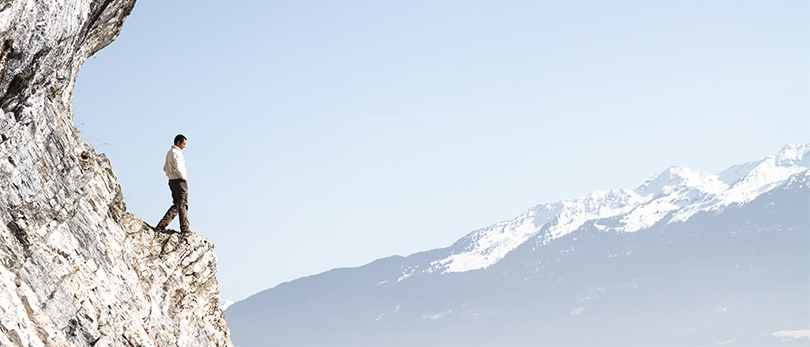Recognising the symptoms of acrophobia, the fear of heights?
Actions as mundane as looking out of a building window or crossing a slightly elevated bridge are exceedingly difficult to perform if you suffer from acrophobia. A multitude of stimuli produce intense fear, but not everyone fears the same situations. There are different degrees of intensity in individuals who are afraid of heights.

What causes vertigo and acrophobia?
The origin of our fear of heights is mainly due to the vestibular system.
Vertigo may be caused by damage to the vestibular system, in which case most symptoms are harmless and of very short duration. The accompanying vomiting and nausea are not usually cause for concern. In acrophobia, however, the discomfort is specifically related to the fear of heights. This creates a phenomenon of anxiety, stress and anguish. A feeling of dizziness may occur, even if the vestibular system is functioning properly. In this case, you are no longer able to trust your own sense of balance and you may regulate in different ways (by immediately stepping down from the ladder you have climbed up, by kneeling or crouching to maintain contact with the ground, etc.).
Family influence
The onset of the disorder is also often related to the upbringing of the acrophobic person. First of all, if you come from a family that tended to protect you a lot or even overprotect you, you are singularly more likely to be prone to anxiety. The fact that your parents regularly told you to be careful makes you much more aware of the potential danger of every situation. A bad experience at altitude is enough to confirm the idea that these types of situations are really dangerous and should be avoided in the future.
The phobia can also be the result of vicarious learning. That is, your fear of heights may have been built up by imitating the behaviour of family members. Indeed, if as a child you saw one of your parents or siblings panic when they were high up, it is quite possible that, given your proximity, you were convinced that this was an inherently dangerous situation. Having heard stories of accidents that have happened to members of your family may also be a strong factor.
The hereditary factor should also not be overlooked. There is a greater chance of being acrophobic if one or both parents are acrophobic. If the social influence has been clearly identified, we cannot put aside the genetic dimension which can also partly explain the appearance of the fear of heights.
How to prevent acrophobia, the fear of heights?
Anticipate as much as possible the places where you may be exposed to vacuum
It is when you take exaggerated measures to escape your anxieties that the phobia becomes a barrier to your normal functioning. Your desire to avoid dreaded situations at all costs can make you anxious, tired and disrupt your sleep. It may even prevent you from concentrating as you become unable to focus on anything else.
When you have no choice but to confront the phobogenic situation, you may experience extreme anxiety and trigger what is known as a ‘panic attack’. The symptoms and sensations generated can be different from one individual to another:
-
-
- Increased heart rate
- Difficulty breathing
- Transpiration excessive
- Inability to move (temporary paralysis) despite an irrepressible urge to flee
- Dizziness, vertigo
- Trembling of the legs
- Feeling of being drawn to the void
- Feeling of oppression
- Inability to reason, to objectify the situation
-
How to overcome fear of heights and acrophobia?
A separate phobia
Acrophobia has a special status among the specific phobias in that it is the only one that increases significantly with age. In general, age can be a factor in reducing the phobia. This can be imagined in the case of animal phobia for a child, for example, who will find it easier to control his or her anxious reactions to the animal in question as he or she grows older. In the case of fear of heights, the opposite is true. There are several reasons for this.
First of all, our balance is weakened as we grow older. Our inner ear gradually deteriorates and makes us more prone to vertigo. In fact, unlike other phobias, acrophobia can appear much later because of this new fragility.
On the other hand, age increases the feeling of vulnerability. Acrophobia relies heavily on confidence in one’s own ability to maintain balance, both in general and more specifically in the face of heights. This confidence decreases with age due to altered physical abilities, as we have seen, but also due to limiting beliefs that artificially accentuate the idea in our minds that we can fall at any moment.
Acrophobia usually affects young adults and should be treated as early as possible
If you feel concerned and experience the same symptoms as described above, do not hesitate to contact a health professional. The appropriate use of medication (if you have panic attacks) and psychotherapy (CBT, VRET, psychoanalysis, etc.) are solutions that will enable you to overcome your difficulties and regain pleasure in your activities.

